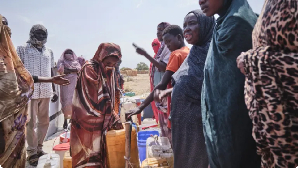Dimabi (N/R), Mar 14, GNA - Residents in Shea butter producing communities in northern Ghana have been asked to desist from felling the shea tress.
Madam Anna-Maria Fati Paul, Chairperson of the Northern Ghana Community Action Fund (NOGCAF), who made the call, said the high rate at which shea trees were been destroyed would render the people especially women and children, who depended on the shea industry for sustenance, poorer.
She was addressing a Community Sensitization Forum on the management of the shea tree as an economic resource for poverty reduction in rural communities in northern Ghana organized by NOGCAF at Dimabi, a shea butter producing community in the Tolon/Kumbungu District of the Northern Region on Saturday.
NOGCAF is a northern Ghana-based organization, which has grouped and trained over 500 women in 11 communities of five districts in the Northern Region, on quality control measures of producing shea butter and has secured lucrative markets for the product (shea butter). Some of the communities include; Mbanayili, Dalum, Kpatili, Pisinga, Bulungu, and the districts include Savelugu-Nanton, Gushegu-Karaga, West Gonja and Tamale Metropolis.
Madam Fati Paul, who spoke on the topic: 93Shea: A Key Resource to Poverty Reduction", therefore, called on the chiefs and people to guard against miscreants who made it their stock in trade to fell the trees.
She said the shea tree possessed enormous potentials in terms of economic and medicinal values therefore, the need to protect it for the benefit of the people.
Women in the communities complain that some people have been felling the shea trees for use as firewood, ironically to process the resource into shea butter. High temperatures are required at a stage of in the processing of the shea nut into shea butter. She said members of the communities must find a sustainable way of generating firewood for processing the resource, as did by NOGCAF, which was to cultivate a plantation of teak tress to be used as firewood.
Madam Fati Paul also criticized the recent phenomenon whereby large tracts land dominated by of shea trees are released to business groups and institutions to make mango plantations saying it was depriving the locals of their livelihoods since most of them depended on the shea industry keep body and soul together.
She said NOGCAF was not against the cultivation of mango plantations but believed that such a plantation should be cultivated on lands or areas that did not have shea trees.
In a speech read for him, Alhaji Iddi Manza-Mahama, District Chief Executive for Tolon/Kumbungu, called for an end to bush burning in the communities saying it was a threat to the survival of the shea trees and the maintenance of the eco-system.
He pledged to support the women to improve the shea industry. Mohammed Danaa, Regent of Dimabi, thanked NOGCAF for organizing the forum in the area saying it had enlightened the people, expressing the hope that those bent on felling the trees would desist from it. Madam Hawa Issah, President of Tungteiya Women's Group, one of the beneficiary groups, thanked NOGCAF for its assistance saying it had empowered women economically, and enabled them to cater for their children's school needs. 14 March 11
General News of Monday, 14 March 2011
Source: GNA
Do not fell shea trees - Northern communities told
Opinions











